


This summary for Game Four was written by Eauxps I. Fourgott. Many thanks for volunteering to put this report together! 

Game Four started out with an interesting assortment of leaders who had, for the most part, seen modest success in the tournament, but not been the most dominant leaders. While five of the seven had reached the playoffs in the past, none had more than two wins total in the past four seasons; even Kublai Khan, who had reached the championship game three seasons in a row, had mostly made it there with second-place finishes rather than being the most dominant leaders. Others, like Ramesses, Saladin, and Ragnar, tended to be relevant in their games but rarely found actual success. The field was also a balanced mix between low peace weight leaders and higher peace weight leaders who were still relatively low as far as high peace weight leaders go, with the neutral Saladin in the middle and more likely to act based on religion. No leaders were truly isolated among others of opposite peace weight (although Hannibal was close), and in sharp contrast to the clear-cut Game Three, this one looked to be a contest where almost anything could happen.
A big early point for this game was the contested territory between Hannibal and Pericles. There wasn’t much land here, but there was copper and gems in that space, right near Hannibal’s borders. As it turned out, Hannibal decided not to expand this way with his first settler, but Pericles did. He didn’t grab the copper or gems, but he did grab a good amount of that contested territory for a good start. Hannibal had chosen to go the other direction in the meantime, founding straight towards Saladin. Saladin and Kublai also grabbed contested space with their first plants, while Vicky and Ramesses opted for relatively unhelpful settlements on the coast and Ragnar went straight south into the tundra.

Saladin got the first religion of the game uncontested, founding Islam as the only leader in the game to start with Mysticism. The holy city of Medina promised to be an important one, as it was situated downriver from Kublai’s capital, making the religion more likely to spread. Meanwhile, nobody seemed interested in going for the second religion right out of the gate, leaving that aspect of the game up in the air to start with. Eventually Kublai became the first leader to gun for the second religion, looking in the pole position to land it with no resistance and messing up the likelihood for him and Saladin to become religious best friends. That indeed happened, as Kublai had an easy path to Polytheism and founded Buddhism, putting both early religions in the western part of the map.
On the expansion front, Victoria got a third settler out miles ahead of anybody else, thanks to a combination of her Imperialistic trait and building the settler in her capital. She wisely sent this one to claim some land in the center of the map. Pericles made another savvy choice for his third city, going to the west again where the land was contested and claiming a nice spot between Ramesses and Hannibal, also staking his claim on Hannibal’s border gems. It was a good-looking start for Pericles, especially as Hannibal settled away from him again for his third city. Meanwhile, Ramesses plopped his third city directly between Vicky’s and Pericles’s, opening up the possibility of border conflicts there later on. Yet he didn’t have much of a choice; already, at just three cities, he was almost out of territory thanks to Vicky and Pericles both expanding towards him. It definitely looked like the Egyptian leader was doomed to irrelevance in this game.

Ragnar entertained everybody by continuing on his poor start, sending an unescorted settler VERY far to the west, not claiming any contested territory and racking up city maintenance costs in favor of grabbing a copper source that was safe from the other leaders anyway. He was clearly doing the worst of all the leaders to start this game off. Meanwhile, Hannibal finally pushed against Pericles, putting his fourth city plant right against the borders of Sparta. This had the potential to open up a path to Pericles’s backlines for the Carthagian settlers, but it was also going to be a tough spot to hold and would increase border tensions a lot. Saladin similarly planted right on Ragnar’s borders with his fourth city, while Ramesses made an extremely questionable plant, putting his fourth city far from his core, on the border of the holy city Medina. He was about to build Stonehenge, but otherwise his situation looked pretty desperate.
The first religious spread happened when Victoria picked up Saladin’s religion of Islam. This was probably better for her than picking up the Buddhism of Kublai, who was lower peace weight and less likely to ever align with her. However, a few turns later she founded Christianity, making a conversion likely, which would probably doom her. Meanwhile, Hannibal decided to start a very early war with his neighbor Pericles. On the one hand, this seemed unlikely to succeed since it was so early… but on the other hand, Pericles had no metal yet! There was iron on his eastern coast, but he hadn’t settled by it or researched Iron Working yet. There was a chance that Hannibal would be able to gain some ground here, and that would doom Pericles, but if Hannibal couldn’t capitalize then he’d get dragged down into obscurity. The attack came in… and Sparta fell. That was a bad blow for Pericles. He was about to research Iron Working and potentially hook up some iron, which would give him still a fighting chance, but this left him crippled right out of the gate.
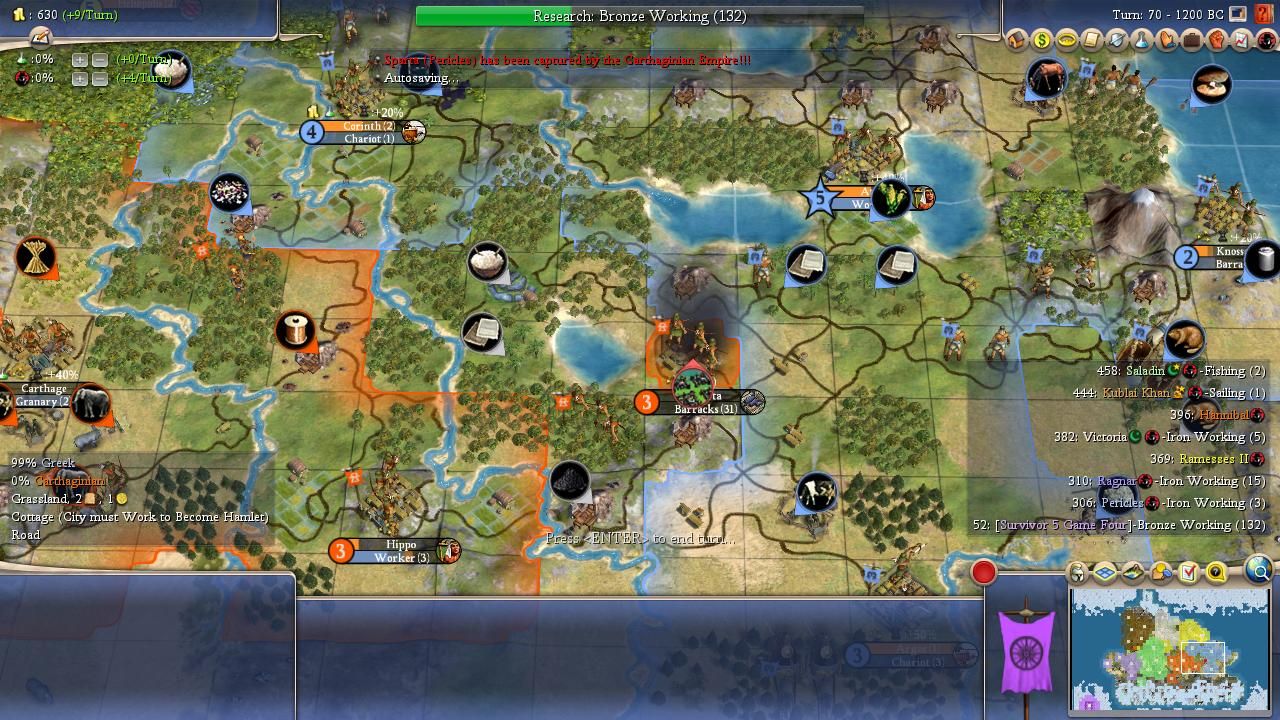
As the landgrab phase was coming to a close, Saladin had a very nice pocket of land for himself, having grabbed all of the land between him and Ragnar. Vicky and Ramesses were both pretty squeezed. Kublai had a decent but not particularly large area to himself, while Ragnar had barely expanded and still had tons of backlines to fill. But he didn’t care about that, he had a warpath to go on against Arabia. Ragnar didn’t appear to have a dedicated attack stack, but that wasn’t stopping him. This honestly looked like a poor choice for him and a good turn of events for Saladin, who had a much bigger production base. Nothing of note immediately happened in this war. Meanwhile, on the religious front, Victoria did indeed further doom herself by converting to Christianity, while religion spread to the eastern civs: Ramesses picked up Kublai’s Buddhism and Pericles picked up Saladin’s Islam. A little later, Hannibal decided to join Victoria’s Christianity. The religious scene was all kinds of a mess right now, and it was hard to tell what would become of it.
Meanwhile, in Greece, Pericles’ situation continued to look dire. He had researched Iron Working and built a city by the iron in his backlines, but he was taking his sweet time connecting the iron. Hannibal was marching a large stack of axes through Greece, and quickly took Corinth, knocking Pericles down to just four cities. It was looking like the Greeks might have taken action too late. However, shortly after this, Pericles was able to finally connect the iron and start pumping out some Phalanxes. He had staunched the flow of blood for now, although it looked like his strong start had been completely destroyed. Meanwhile, two of the weaker leaders were duking it out as Ramesses surprisingly decided to attack Victoria!
Leave it to religion to drive a wedge between the high peace weight leaders. If Vicky or Ramesses could take over the other, they might have a chance at being relevant in this game. While Ramesses had declared the war, Vicky drew first blood, taking the isolated city of Elephantine right away, so maybe she would have a chance – if Kublai didn’t backstab her. Meanwhile, Pericles faced an assault on his capital from Carthage, and the attack just fell short. He wasn’t dying yet, but it still felt like it was only a matter of time. Saladin wasn’t making any progress against Ragnar yet despite his superior production base – that war was still a stalemate, if one that favored Sal. But that position was threatened when the last leader at peace jumped in:

Kublai liked Vicky less than Saladin, but this attack still made enough sense given the rival religions. Kublai was making a power play here, and if he could knock the game leader down a peg, it would benefit him a lot. However, his initial attack failed to accomplish anything, leaving Saladin secure enough for the time being, and Sal signed peace with Ragnar shortly afterwards, letting him put his full focus on Kublai. He quickly moved a gigantic city up to Mongolia, devastating Kublai’s attack stack, but he wasn’t able to successfully attack the Mongols. It looked like Kublai was hitting the Arabian stack with attackers before they got the chance to siege the city, and that was disrupting Saladin’s offensive. Eventually the stack got completely picked off, and afterwards the two leaders signed peace.
Sullla editorial addition: This was the first big turning point of the game. Kublai was perfectly positioned to attack Victoria and seize her land in an easy 2 vs 1 war. They had different religions, it was a high peace weight versus low peace weight situation, and Victoria was the "worst enemy" of Kublai. Instead he threw away his game by launching a bizarre and pointless attack on Saladin instead. This kept Kublai bottled up on half a dozen cities instead of snowballing ahead and ensured that Ragnar and Victoria would stick around for ages to come as weak leaders waiting to be gobbled up. It was a gigantic mistake and missed opportunity for Mongolia.
Even though he hadn’t taken any land in this war, Saladin still exited it looking like he was in the pole position. He had the most territory of anybody right now, and was far and away the score leader. Hannibal had the potential to rival him, but first he needed to finish off Pericles, and he just wasn’t doing that right now. Carthaginian stacks kept ramming their heads against Athens, which was too well defended to capture pre-catapults, and Hannibal’s economy was a mess in the meantime. Sal was now at peace and with a well-established economy, and that gave him the opportunity to pull ahead. Up in the north, the three leaders combined for just 13 cities. None of them had expanded that well, and while they were 2nd-4th in score, they paled in comparison to Arabia. Westwards, Ragnar was still a wreck, still below Pericles in score, and unlikely to be competitive unless Saladin got dogpiled down the road.
The next war was one that the audience expected, if not started by who they expected. Unable to make progress against Egypt, Vicky made an admirable effort to make a name for herself by attacking Mongolia. It did feel like Kublai had the advantage here, but it wasn’t huge, and we could get surprised. It didn’t seem too likely though, as Kublai quickly destroyed her attack stack. In the meantime, Hannibal finally punched through, taking the vulnerable city site of Corinth. He was finally knocking Pericles out, but he needed to get a move on and fix his economy. That became all the more apparent just a couple of turns later:

Saladin backstabbed Hannibal and took a city right away, and suddenly Hannibal’s situation looked MUCH less pretty. This was a relatively unlikely declaration, as of Saladin’s four neighbors, he probably had the least bad blood with Hannibal. But Hannibal was still a rival, practicing a different religion and with cities pushing right against Saladin’s borders, so this was hardly a completely random move. In any event, both leaders took gigantic losses in soldiers early on, and it looked like this war wouldn’t be particularly good for either of them. Who this WAS good for was Pericles, who had received a welcome stay of execution, and Ramesses, who was being left alone to tech upwards and was somehow in a comfortable second place despite having just five cities.
Sullla editorial addition: Second huge turning point in the game. Hannibal had just picked up Construction tech and was about two dozen turns away from finishing off Greece and becoming the game's runaway AI. Instead of an easy mopup conquest yielding four more high quality cities and a chance to consolidate, Hannibal lost both of his Arabian border cities and was forced to fight a desperate battle in the hopes of recapturing them. Saladin's decision to attack Hannibal was wildly unlikely: he was "Annoyed" with Ragnar and Kublai (both of whom had already attacked Arabia) and Victoria while being only "Cautious" with Hannibal. It was a perfect timing attack that slowed down the Carthaginian snowball right when it was about to take off and threw the overall game state back into a confused mess.
As we hit Turn 150, the game was still completely up in the air. The only leaders who didn’t seem to have a shot were Ragnar, who still probably wouldn’t recover from his horrendous start, and Pericles, who had been devastated beyond recovery thanks to Hannibal’s early attack. Of the others, Hannibal was still the most militarily powerful, but his economy was in shambles and he was locked in a war with the other most powerful leader. Saladin had been pulling ahead, but he’d lost a ton of units in his war with Carthage and was now in danger of falling behind, in addition to being the only leader practicing Islam after Pericles converted to Christianity a few turns later. Kublai and Vicky had both lost their attack stacks fighting each other and needed to break through to have a real shot. Ramesses was somehow in one of the best positions right now, staying happily at peace and building a tech lead over the rest of the field.
The war and peace horns both boded ill for different leaders in the next few turns. Ragnar went to war again, deciding to attack Kublai and stick him in a two-front war, which he was unlikely to gain from. Meanwhile, Hannibal and Saladin signed peace, signaling the deathknell for Pericles, who was once again left alone to bear the full brunt of Carthage’s assault while giving Arabia a chance to build back up. Ragnar’s first attack in Mongolia completely failed, but it didn’t look good for Kublai. He was fighting two wars at once, and both were being fought in his territory. He wasn’t losing cities yet, but he was losing economic power, and gaining nothing.
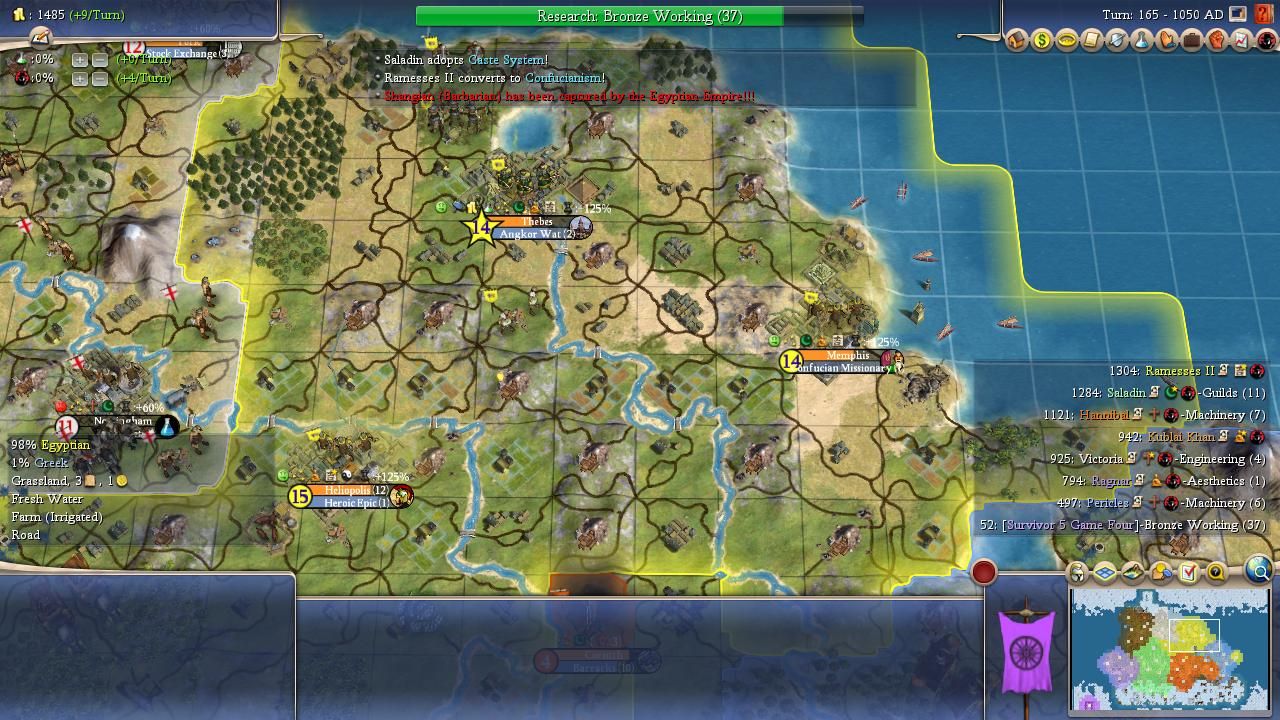
Ramesses continued to put on a very interesting show for us. He took the eastern barbarian city of Shangian to join his earlier conquest of Mycenian (which was right next to the Greek city of Mycenae) and push him up to six cities… and he was somehow now the score leader! His situation got even better when the former Greek city of Corinth flipped to him. However, he did decide to convert to his own personal religion of Confucianism, diplomatically isolating himself and worsening his situation down the road. Elsewhere, Kublai and Victoria had been dragged down by their war with each other, and it now was a clear case of Hannibal, Saladin, and Ramesses as the top three leaders in the game. Sal’s large territory base allowed him to hang in there, while Hannibal was finally pushing through and conquering the rest of Greece.
Meanwhile, Ragnar decided to shake things up some more, signing peace with Kublai and attacking Saladin again turns later. Not a very wise decision. Saladin quickly cleaned up Ragnar’s attack force, and it looked like this war could only be bad for the Vikings – indeed, Saladin soon turned around, marched in, and conquered Ragnar’s capital of Nidaros, representing a crippling blow against the Vikings. In the meantime, out east, the Greek capital finally fell, spelling the end of Pericles:
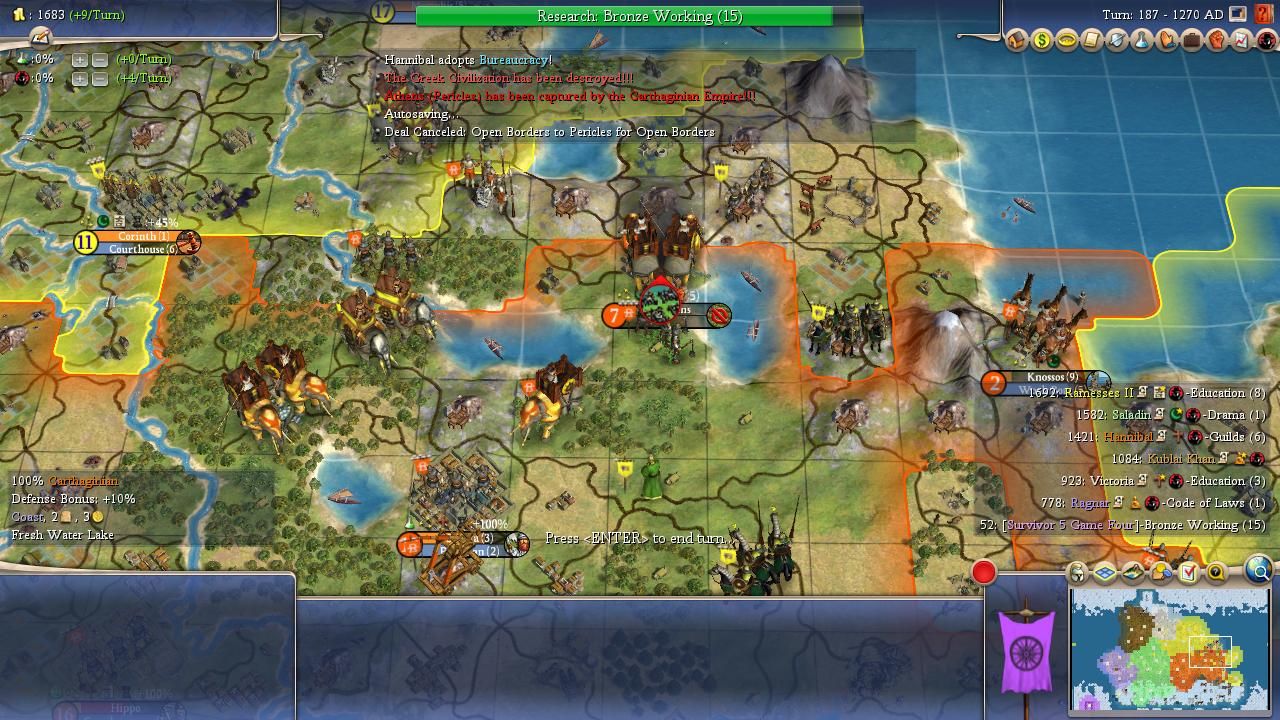
Poor Pericles. He started out doing very well, and had he been left alone a while longer could probably have been the game leader. But a lack of metal right near his starting position was his Achilles Heel, he didn’t act about it quickly enough, and Hannibal made an opportunistic strike that worked out against the Greek leader. I’d say his defeat was somewhat due to a glaring mistake on his part, somewhat due to a successful big move on Hannibal’s part, and mostly due to bad luck. Meanwhile, this was excellent news for Hannibal. His economy was still far below that of Saladin and Ramesses, but he now had a good territory base and the ability to peacefully build it up some, unless he chose to go straight back to war. But his game had definitely been stunted when Saladin backstabbed him, and now Sal himself was threatening to absorb a weak neighbor. It was hardly a slam-dunk game for Carthage.
Ramesses was in the lead of the three leaders, but his position appeared the most fragile. But he was aiming to change that by attacking Vicky, who was exhausted from a long war with Mongolia, and instantly took her first city, leaving her with just three. If he could finish this war quickly and successfully, he’d get a good pocket of territory and solidify his lead. But it wasn’t going to be that easy for him:
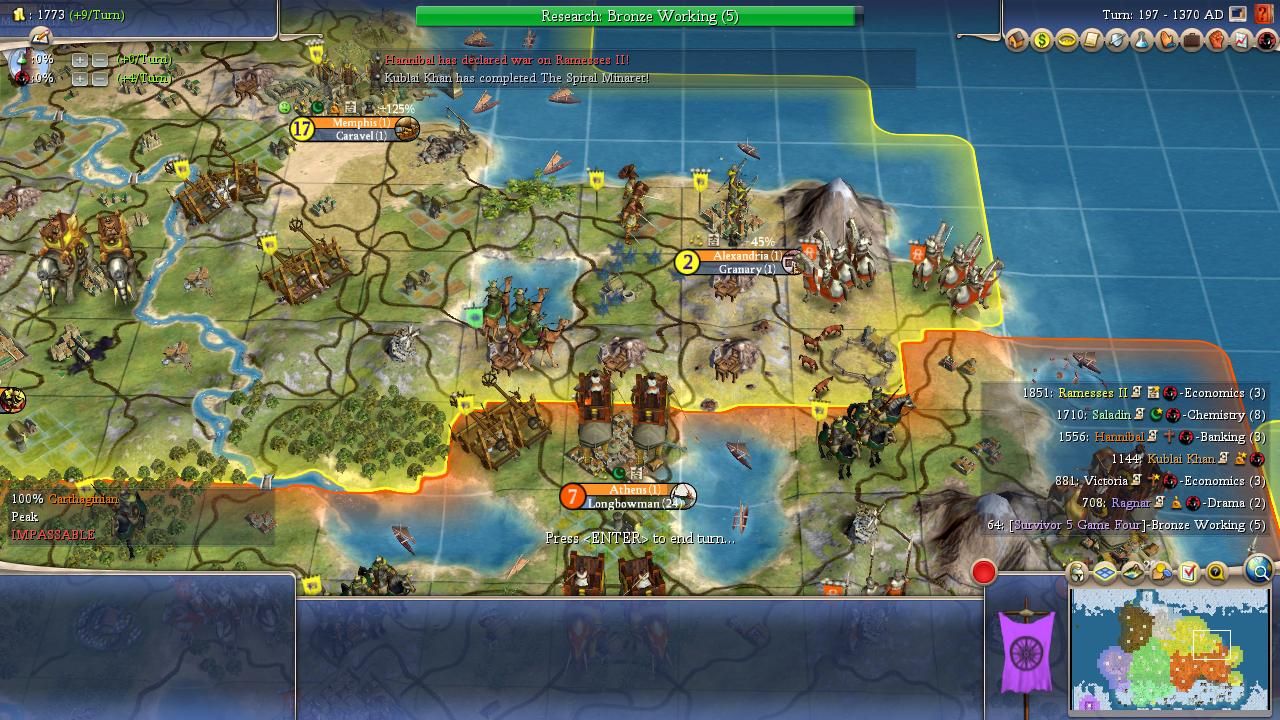
Hannibal chose to backstab Ramesses rather than take time to build up his economy. He had Egypt at its most vulnerable, and had the potential to solidify his position as one of the top two leaders. But he was also digging his economic hole deeper, and it remained to be seen if that would come back to bite him later. In the short term, he was looking good, conquering Corinth quickly and not looking to be stopped soon. Hannibal had just been building his military the entire game, and with the other leaders not beelining Rifling, Carthage was still on top of the power bars. If Rams couldn’t turn it around quickly, he was in trouble.
Once again, a well-timed war represented a stay of execution for a dying leader, and this time that leader was Victoria. Ramesses had taken York from her, leaving her with just two cities, but he called off the offensive after that and she was able to retake the city. She was still at war with Kublai, and Ragnar chose to attack her as well, but Kublai was surprisingly still accomplishing nothing here, and she was holding out for now. Meanwhile, Saladin had had some time to consolidate his economy, but decided that he’d had enough of that and attacked Ragnar. Round 3 of Arabia versus Scandanavia, and there was no question that Ragnar would die if this didn’t end quickly.
The wars slowly ground on. Sal, Kublai, and Hannibal were in no danger, but they were going nowhere fast. Sal was in the best position against Ragnar, but even his assault was going slowly. Kublai finally took one of Vicky’s cities, but assaults against the last two were not coming quickly. Meanwhile, Hannibal had gone straight for Egypt’s capital, but he had just two catapults plinking away at its defenses for just 2% bonus gone per turn. Ramesses had finally started to research Rifling, and it looked like he may have the chance to stabilize. That wasn’t the case for Ragnar, as Saladin finally put their old rivalry to rest for good:

Ragnar never got off the ground this game. He sent his first settler straight into the tundra, sent the second far far west away from the other leaders, and from that point on did nothing to deserve a better position. He was rightfully completely ineffectual as a result, only outlasting Pericles because his neighbors weren’t so interested in killing him right away. Those two leaders had looked in solid positions to start the game, since they had the most land to expand into, and yet they were the first two to die. Go figure. Meanwhile, up north, Ramesses finished researching Rifling, but it was too little, too late for him. Hannibal punched through and conquered Thebes and its absolute treasure trove of wonders, and this seemed to be the deciding blow in their struggle. Ramesses probably wouldn’t recover from this, leaving Hannibal and Saladin as the top two leaders duking it out for the win.
Sullla editorial addition: Third and final turning point in this game. Hannibal captured the immediate Egyptian border city and then chose to march all the way to the capital of Thebes instead of hitting a closer city. He had brought only two catapults with him and as a result the Carthaginian stack of 50 units sat around for dozens of turns plinking away at the 125% city defenses from walls + castle + Chichen Itza. Hannibal's invasion of Ramesses was therefore much slower than it could have been given the major advantage he had in power, stretching on for dozens and dozens of turns on end. If he had brought more siege units, or if his siege units had simply died in battle, Hannibal could have absorbed Egypt at a much earlier date. His slow pace of conquest gave Saladin time to seize control of the game by running over the remaining weak leaders in the west.
Meanwhile, Kublai wasn’t able to delay forever, and finally finished taking out Victoria:
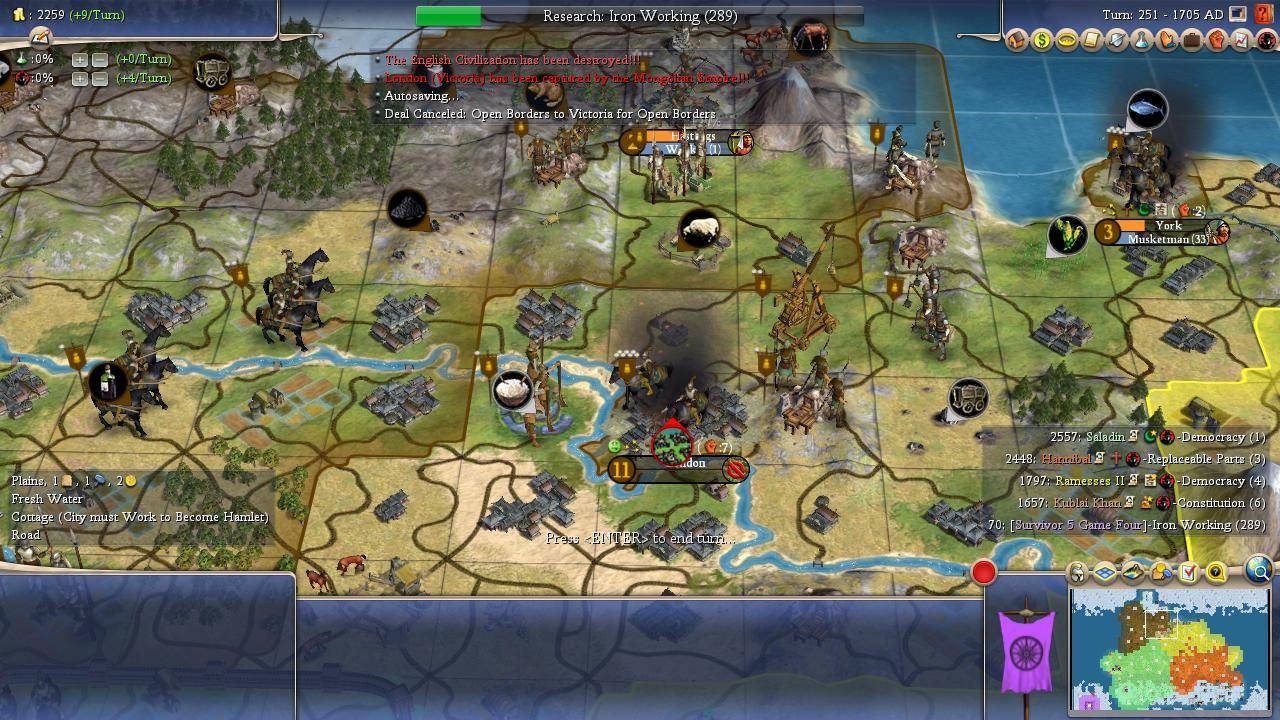
Victoria did surprisingly well this game, not caving until Ramesses attacked her. But like Elizabeth last game, she never built more than four cities, only briefly taking an Egyptian city for five, and that wouldn’t cut it. She couldn’t get any conquests going on, even against her similarly small neighbors, and for the most part was diplomatically isolated from the rest of the world. It was only a matter of time for her. As for Kublai, he had taken a few cities, but it was far too little, too late for him to have a shot at relevance unless Saladin and Hannibal went to war and one of them got knocked out. His life or death depended on Saladin’s whim. Meanwhile, in the east, Hannibal was spamming out grenadiers against Egypt and overwhelming their land. He was getting close to Rifling, and once he reached that it would be curtains for Ramesses.
Well, Saladin’s whim wasn’t in Kublai’s favor. Arabia declared war and took two cities instantly, leaving Mongolia with just seven remaining and without hope of surviving without a peace treaty. Meanwhile, Hannibal finished researching Rifling and took another Egyptian city, further sealing Ramesses’s fate. It was now a race to see which of the two weaker leaders would die first, and once that was over, it would be just Saladin and Hannibal on the map. Even though the two were only in the Renaissance in terms of tech, they were entering the endgame phase. The two conquests went at about the same pace, cities falling quickly or slowly depending on how many siege units were or weren’t brought be the attackers. But it was Hannibal who ended up finishing first:
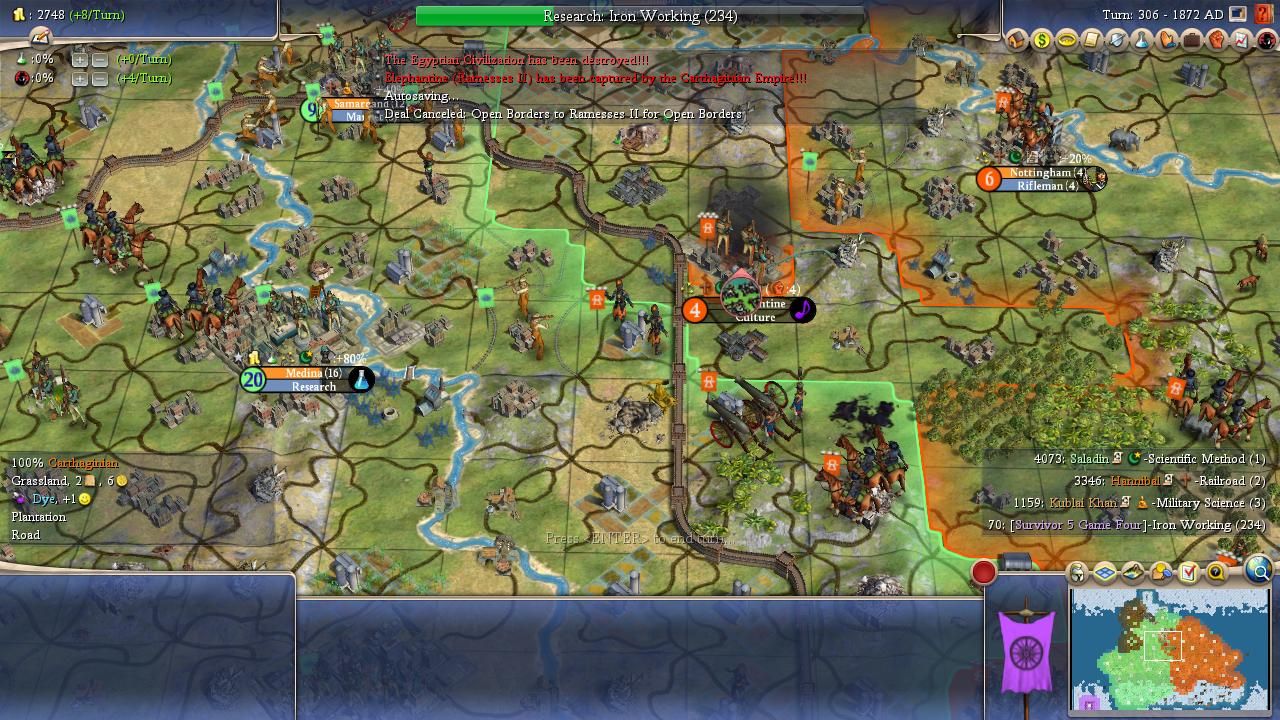
Note that it took 109 turns for Hannibal to complete his conquest of Egypt. Ramesses did far better than he had any business doing in this game. It was true that he got a bad draw, only getting space to expand to five cities and only actually going to four because he had so little potential land, but when he had a period without wars he capitalized, and for a while it looked like he had a legitimate chance to win. But he got hit by Hannibal at the worst time possible, hadn’t built up his military enough, and fell to the Carthaginian war machine. Ramesses performed impressively given his situation, but he would’ve needed a miracle to win, and he didn’t get one.
Kublai followed in his footsteps shortly thereafter on Turn 321. For all that Victoria had played unimpressively, Kublai had done almost as lamely. He only expanded out to five cities, and never took more until Ramesses crippled Victoria late in the game. Kublai didn’t do anything worthy of a playoff spot, and for once his luck failed him and he was eliminated early. There would be no return visit to the championship game for him this season.
That left just two leaders in the game. After fighting for over 200 turns without stopping, Hannibal had taken a lot of territory, and was somehow still almost even with Saladin, who’d played a much more balanced game, in almost all categories. It looked like he might have a window of opportunity, as he was the first leader to go for Assembly Line, but Saladin followed right away to nullify that threat. The two leaders were roughly comparable, but Sal was slightly ahead in every category, so he was favored to win at this point. But Hannibal was going to do his darndest:

Never, never was going to stop and stay at peace this game, was he? The difference between this war and his previous two was that this time, Hannibal didn’t have an edge. Saladin was just as well-equipped as he was, and had a slightly bigger army. As the attacker, Hannibal did get first blood, taking York and the Statue of Zeus, and he continued for a while, taking three more Arabian cities without any vengeance immediately coming from Saladin. Sal had a giant stack of almost 200 units, but they were just sitting around in his territory, not actually doing anything to help, and it started to look like this might doom him – he might just sit there and let his core get eviscerated, and thus get run over!
This was a major failure by Saladin. He did absolutely nothing and let Carthage take five border cities, then signed a peace treaty that gave away another city without ever using his huge stack of units! With that extra edge, and no more war dragging down his economy, Hannibal now had a better chance of winning than he did before. This was going to be a close one, and hard to call. The problem with Carthage’s conquests was that they were still crushed by Arabian culture, so they didn’t help Hannibal so much as they hurt Saladin. Sal also still had the tech edge, picking up Industrialism for tanks quickly after signing peace, popping a golden age to build up, and grabbing all the lategame wonders. But Hannibal wasn’t too far behind – especially in terms of population, they essentially each had half of the world’s people. Ultimately, though, we were just waiting for the next war to come – the two leaders had backstabbed each other, they still had poor relations, and it seemed like just a matter of time before one attacked the other.
But the game kept dragging on without an attack. The two leaders continued building their economies, and Hannibal continued to be slightly behind Saladin. He couldn’t research quite as fast, and he was about six techs behind, so if an attack never came, this looked to be Saladin’s game via spaceship. If an attack did came, Sal had the edge for a Domination win, but Hannibal could squeak it out instead. In any case, though, this was going to be one of the longest games in AI Survivor history – over 370 turns long and counting. Especially if Saladin won, this was not going to be a high-scoring game in the picking contest. Hannibal continued building up his research base, and finally actually pushed ahead of Sal in beakers per turn, but it wasn’t going to be enough to make up the tech gap. Saladin picked up Robotics for mech infantry and Composites for modern armor, rendering a military win by Hannibal virtually impossible, and then built the Space Elevator for that extra edge if it came down to building the spaceship faster. It looked like it was too late for Hannibal to change the game now, as the game continued on with the attack we were all expecting failing to actually manifest. Finally, something happened:
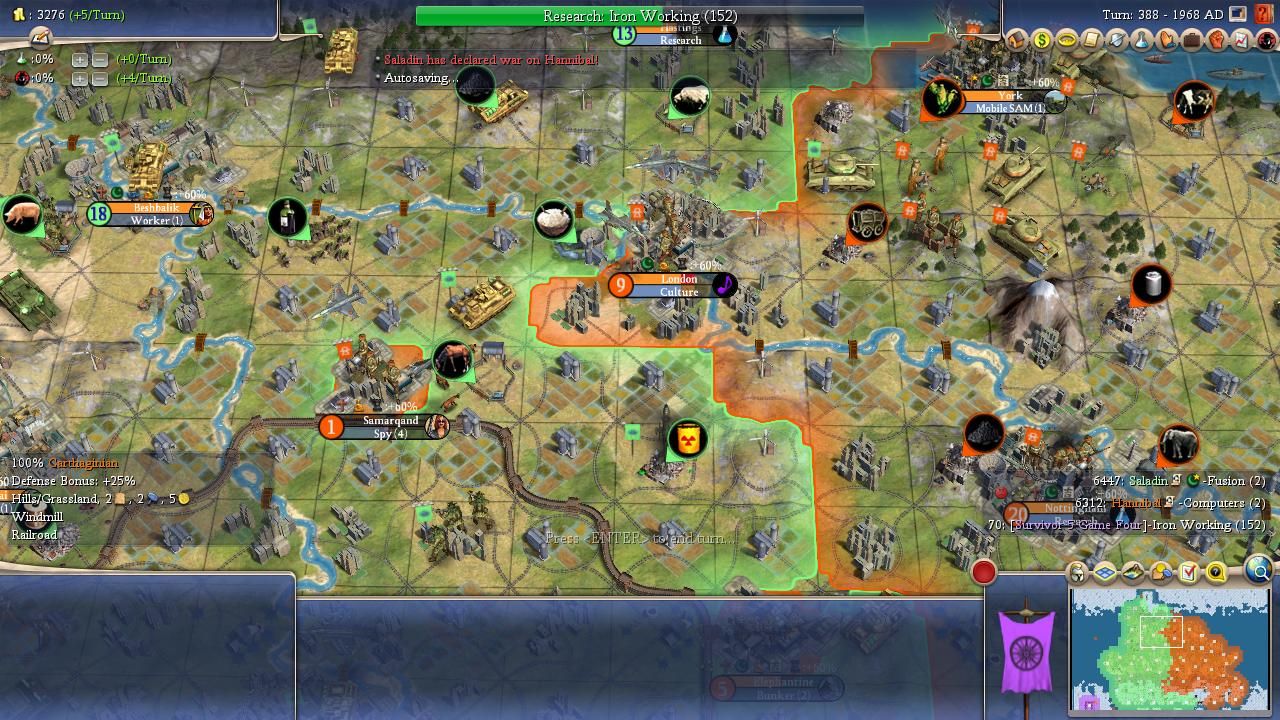
War #15, as Sullla hit his number of wars prediction head-on. Saladin evidently wanted to secure his victory by knocking Carthage back, and he was making his move. The first turns of the war saw not much in terms of decisive combat. Somehow Hannibal was the one with all his units in Arabian territory, and both sides were taking steep losses on the power graph. But Saladin had more power to begin with, and Hannibal was taking more war weariness despite having the Statue of Zeus because all the fighting was in enemy territory! Arabia started pushing back, clearing out the Carthaginian units from Sal’s territory and taking a city back in Basra. Even as Hannibal got access to mechs and modern armor, he started to lose more territory and fall behind on the power graphs. Saladin had finally started using his almost 200-unit Stack of Doom, and there was no stopping that. Meanwhile, he started swarming Hannibal’s territory with gunships, creating an amusing sight of all the green copters swarming through Carthage (like a locust swarm, as willow_arkan aptly said). Hannibal tried to stop the war with a UN resolution, but Saladin refused peace.
Once again, we were very close to the end of the game, but it was unclear how the game would end. This time, it was between Spaceship and Domination – Saladin had finished the tech tree, but the last spaceship part’s construction was being delayed by high war weariness, while his army continued carving a swatch of destruction through Carthage. At this point it was clear that Saladin would win, but the method of victory wasn’t certain. He was only at 53% land area when he launched his spaceship, so it looked like Space had the edge – and that was indeed how it played out. Saladin was unable to conquer quickly enough to beat the spaceship:
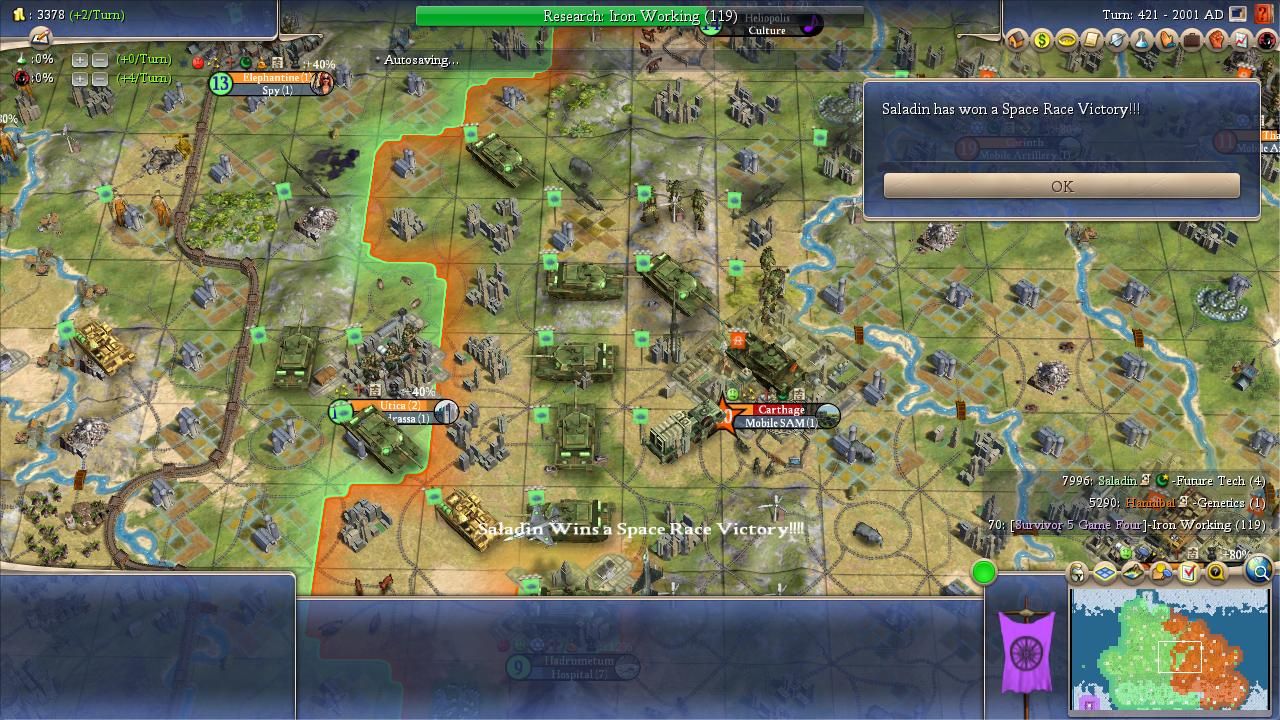
Saladin wins via Space Race, at the very late date of Turn 421. This was a well-deserved victory for him, as he was in the lead for almost the entire game after executing an excellent landgrab. He did benefit from some good breaks, as the other western civs were all weak and the eastern civs were all tied up with each other, but he still played well, ultimately conquering the entire west while still taking some time to make sure his economy stayed running. Possibly the deciding move in his win was backstabbing Hannibal right as the latter was getting ready to roll over Greece – while that did stunt his development some, it also prevented Hannibal from quickly and easily absorbing the Greek empire, instead prolonging his period of warring without developing. Sal obviously didn’t play the best game, given that it took him over 400 turns to win and he was never in runaway status, but he did play the best out of this field and was rewarded with his first trip to the playoffs! Sal has been a power player in games before, just getting knocked out by the end of the game, so it does feel like he deserves to finally have a ticket to Round 2 after five seasons.
Hannibal secured the second-place position to enter the playoffs for the third season in a row. In other games, the way he played here might have spelled his doom, getting himself locked in an early stalemate to stagnate his economy for no gains, or getting wiped out by a technologically more advanced AI due to his constant warring. But here he struck at just the right time to knock out a Pericles who would otherwise have dominated the game before he got access to metals, and in a game where the tech leader was running on four cities for much of the game, he never fell too far behind. His wholesale focus on military made him the power leader for the majority of the game, ensuring that he didn’t fold when backstabbed by Saladin and giving him the edge to immediately take on an otherwise runaway Ramesses, but that and his constant warring did bog down his economy, so that he never really got it properly running until there were only two leaders left. That resulted in him being unable to cash in the win. Hannibal did play well on the whole, timing his war declarations well and taking good advantage of those circumstances, but he didn’t fight efficiently enough, and in a game with competition that played better than his did in this game, he might well have been overrun and eliminated.
This was another pretty wacky game on the whole. Diplomacy especially was a mess, as there never were really strong religious blocs, a bunch of different religions being founded and adopted all the time, and as a result no strong alliances were formed all game, resulting in a bunch of rivalries instead. Saladin spent most of the game practicing a religion that nobody else did, with rivals on every side! Between that, Pericles’ early choke, Ramesses’ unexpected midgame dominance, and Saladin dragging both leaders down early in the game, it was an unpredictable ride, and for the most part an entertaining one. Thanks again to Sullla for running these games!



